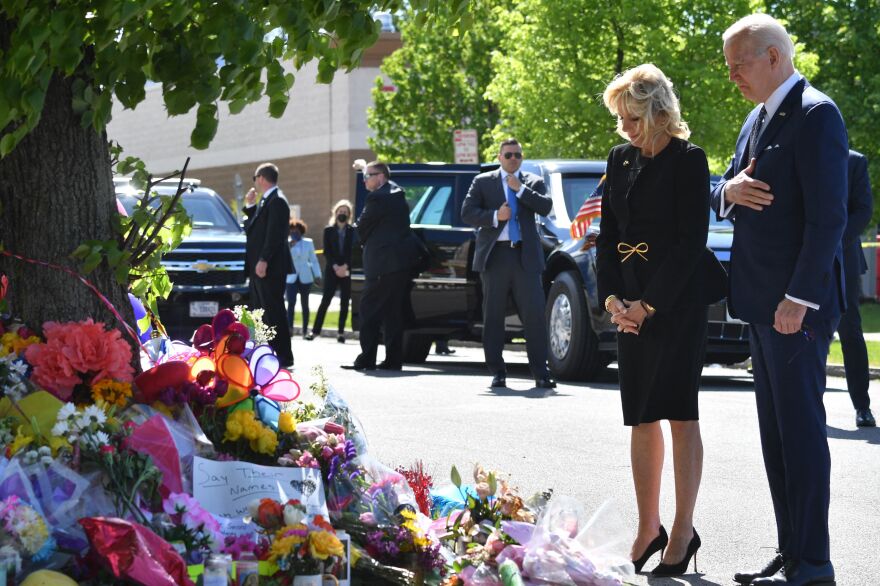Updated May 17, 2022 at 1:21 PM ET
President Biden traveled to Buffalo, N.Y., to visit the scene of Saturday's racist massacre at a grocery store, calling on Americans to reject white supremacy and criticizing the racist conspiracy theory that inspired the shooter.
"White supremacy is a poison. It's a poison running through our body politic, and it's been allowed to fester and grow right in front of our eyes. No more," Biden said in remarks Tuesday at a community center alongside local leaders. "We need to say as clearly and forcefully as we can that the ideology of white supremacy has no place in America."
The president's trip comes three days after a gunman opened fire in a Tops Friendly Market store in a predominantly Black neighborhood of Buffalo, leaving 10 people dead. Following his arrest, the 18-year-old alleged suspect told officials he was targeting the Black community.
"What happened here is simple and straightforward: Terrorism. Terrorism. Domestic terrorism," Biden said, calling the shooting a "murderous, racist rampage" carried out in the name of a "hateful and perverse ideology."
Biden listed the names and ages each of the 13 victims — the 10 who were killed, and the three who were injured — along with details about their lives — "individual lives with love, service and community that speaks to the bigger story of who we are as Americans. A great nation, because we are a good people," he said.
"In America, evil will not win, I promise you. Hate will not prevail. White supremacy will not have the last word," Biden said.
Biden urges Americans to "reject the lie" of Replacement theory
After the shooting, a document allegedly tied to the gunman emerged online. It includes racist, anti-immigrant views and cites the Replacement theory — a far-right, white nationalist conspiracy theory that baselessly claims that white people in America are being systematically replaced by people of color.
"We've now seen too many times the deadly and destructive violence this ideology unleashes," he said. "I call on all Americans to reject the lie. I condemn those who spread the lie for power, political gain and for profit."
U.S. Attorney General Merrick Garland said in a statement that the Department of Justice is investigating the shooting "as a hate crime and an act of racially motivated violent extremism."
Over the weekend, Biden said any "racially motivated hate crime is abhorrent to the fabric of this nation."
"Any act of domestic terrorism, including an act perpetrated in the name of a repugnant white nationalist ideology, is antithetical to everything we stand for in America. Hate must have no safe harbor. We must do everything in our power to end hate-fueled domestic terrorism," Biden said in a statement Sunday.
During their trip on Tuesday, the president and first lady Jill Biden visited the Tops store, which has become a memorial to the 10 who were killed there. They also met with the family members of the victims, first responders, law enforcement and local leaders.
In his remarks, Biden also suggested legislative action to combat internet radicalization and gun violence, alluding to his 1994 crime bill which temporarily banned assault weapons.
Copyright 2022 NPR. To see more, visit https://www.npr.org.




